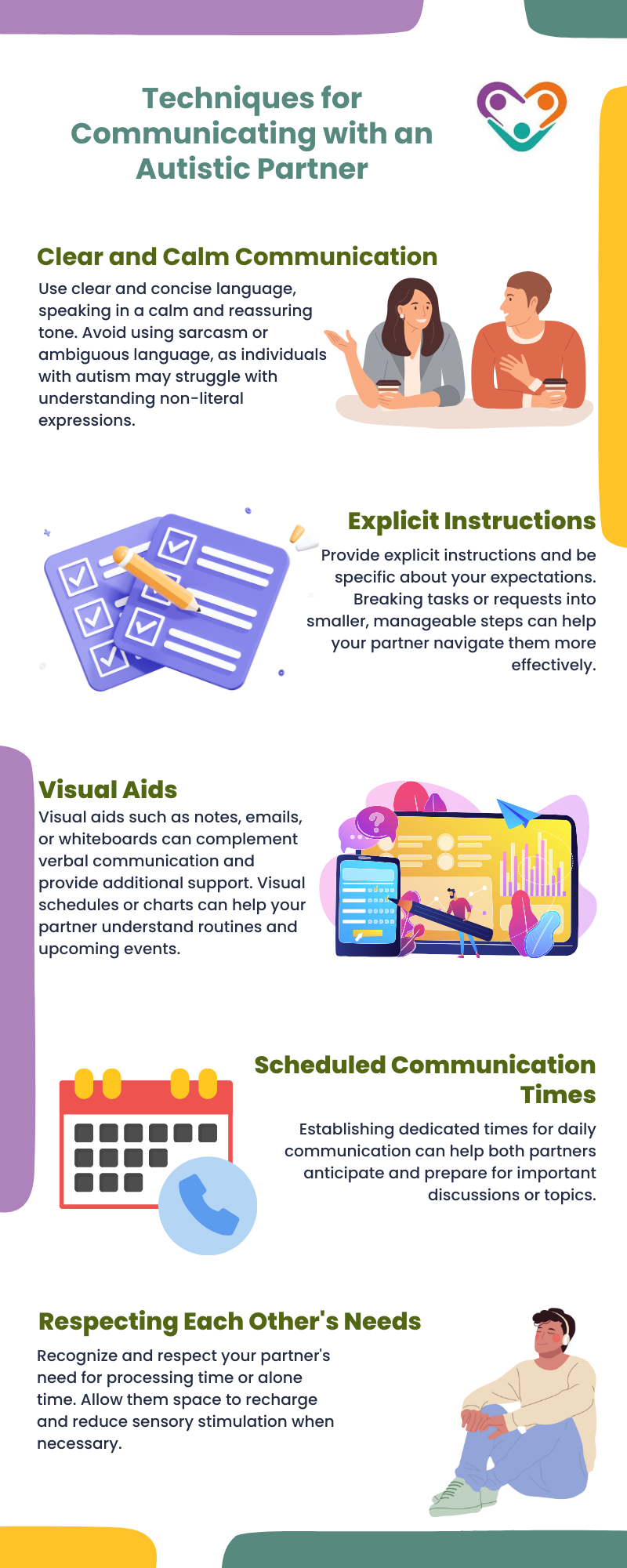Being in a relationship with an autistic boyfriend can be a unique and rewarding experience. It may come with certain challenges, as you both navigate the differences in communication and emotions, but it also brings opportunities for growth and understanding. By learning how to better support each other, you can strengthen your bond and create a more harmonious relationship.
This guide will offer practical advice on how to approach those differences with empathy and patience, helping you build a loving and supportive connection.
Navigating Conflict in Relationships
Conflict is an inherent part of any relationship, and navigating conflict in a relationship involving an autistic individual requires understanding and empathy. In this section, we will explore how trauma history can impact conflict resolution and the importance of identifying triggers and developing coping mechanisms.
Trauma History and Conflict Resolution
For many adults with autism, past traumatic experiences can have a profound effect on their ability to handle conflict in relationships. Trauma can lead to heightened sensitivity, difficulty in managing emotions, and a general lack of understanding regarding others’ emotions.
As a result, conflict situations may be perceived as aggressive and threatening, triggering anxiety and defensive responses.
Due to this, it is crucial to approach conflict resolution with sensitivity and patience when your partner has a trauma history. Encourage open and honest communication, allowing them to express their feelings and concerns without judgment. Creating a safe and supportive environment can help them feel more comfortable discussing their emotions and working towards resolution.

Identifying Triggers and Coping Mechanisms
In order to effectively navigate conflict with an autistic partner, it is essential to identify triggers that may cause heightened emotional reactions or meltdowns. Triggers can vary widely among individuals, so open communication and active listening are key to understanding your partner’s unique triggers.
By identifying triggers together, you can work towards finding coping mechanisms that help manage the emotional intensity during conflicts. Encourage your partner to share their coping strategies and actively support them in implementing these techniques.
For example, they may find comfort in sensory tools like stress balls or noise-canceling headphones to alleviate stress during conflicts.
Developing effective communication techniques is also crucial. Encourage your partner to express their needs and emotions clearly, and practice active listening to ensure that you understand their perspective. Utilize visual aids, such as written or visual cues, to aid in communication and enhance understanding.
Seeking professional support, such as individual therapy, group therapy, or couples therapy, can be immensely beneficial for autistic individuals navigating conflict in relationships. Therapists can provide valuable insight into the challenges faced by autistic individuals, help identify triggers, and offer new coping strategies tailored to their specific needs.
How to Support an Autistic Partner
When in a relationship with an individual on the autism spectrum, it’s important to provide support that addresses their specific needs and challenges.
Sensory issues are common among individuals on the autism spectrum. Some individuals may be hypersensitive or hyposensitive to various stimuli, which can greatly impact their daily lives. To help your partner manage sensory overload, consider the following strategies:
- Use of Tinted Glasses: Tinted glasses can help reduce sensitivity to bright lights and glare.
- Earplugs or Noise-Canceling Headphones: These can help minimize auditory distractions and provide a sense of calm in noisy environments.
- Weighted Blankets: Applying gentle pressure through a weighted blanket can have a calming effect and help regulate sensory input.
- Fidget Tools: Small “fidgets” such as stress balls or sensory toys can provide a tactile outlet for nervous energy and help focus attention.
Incorporating these strategies into your partner’s daily routine will help you create a more comfortable and supportive environment that minimizes sensory overload.
Clear and effective communication is also crucial in any relationship, but it holds particular importance when one partner is on the autism spectrum. To improve communication with your autistic partner, consider the following techniques:

Supporting an autistic partner requires patience, empathy, and a willingness to adapt to their specific needs. By incorporating strategies for managing sensory overload and utilizing effective communication techniques, you can create an environment that supports your partner’s well-being and enhances your relationship.
Remember, each individual on the autism spectrum is unique, so it’s important to listen, understand, and tailor your support to their specific preferences and challenges.
Strengthening Your Relationship
Building a strong and flourishing relationship with an autistic partner requires understanding, patience, and a willingness to adapt.
Partners in neuro-diverse relationships benefit from finding outlets to unwind both together and individually. It is essential to understand each other’s ways of alleviating stress, respecting each other’s needs, and planning for transitions, such as alone time after work. By creating a safe and supportive environment, you can help reduce tension and anxiety.
Engaging in leisure activities together can be a great way to bond and strengthen your relationship. Finding common interests or exploring new hobbies can provide opportunities for shared experiences and quality time. Additionally, incorporating humor into your daily interactions can lighten the atmosphere and bring joy to your relationship.
It’s important to remember that autistic individuals may have specific sensory preferences or sensitivities. Being mindful of these preferences and creating a relaxing environment tailored to your partner’s needs can contribute to a sense of comfort and well-being.
This may include adjusting lighting, reducing noise levels, or providing sensory tools or items that offer comfort and relaxation.

Seeking Professional Support and Therapy
If your boyfriend is on the autism spectrum, then seeking professional support is crucial. Professionals who are knowledgeable about autism spectrum disorder (ASD) or neuro-diverse relationships can provide valuable guidance and assistance.
Therapy can help address various aspects of the relationship, including communication, sensory issues, executive function deficits, and mental health needs. Individuals with autism are at a greater risk for depression, anxiety, and other mental health disorders. Finding a therapist who understands ASD and neuro-diverse relationships can provide the necessary tools and strategies to navigate these challenges.
Cognitive behavioral therapy (CBT) is often recommended for individuals with autism and their partners. CBT focuses on identifying and modifying unhelpful thought patterns and behaviors, promoting effective communication, and improving coping mechanisms.
This therapeutic approach can enhance the overall well-being of both partners and foster a healthier and more fulfilling relationship.
Remember, seeking professional support and therapy is not a sign of weakness but rather a proactive step toward maintaining a strong and resilient partnership. It can provide valuable insights, strategies, and resources to overcome challenges and promote the well-being of both individuals in the relationship.
Final Thoughts
Loving an autistic boyfriend means embracing his unique perspective, understanding his needs, and being patient through the ups and downs. With open communication, kindness, and a lot of love, your relationship can flourish into something truly special.
By standing together and supporting each other, you’ll build a deep and meaningful connection that’s both strong and rewarding. For additional support, Golden Care Therapy is here to help. We offer services at ABA centers in New Jersey, New York, Georgia, and Indiana. Contact us today to learn more about how we can assist you and your family.



